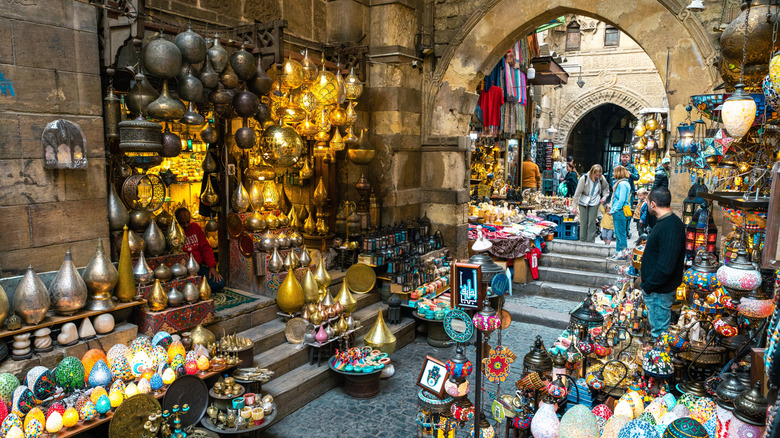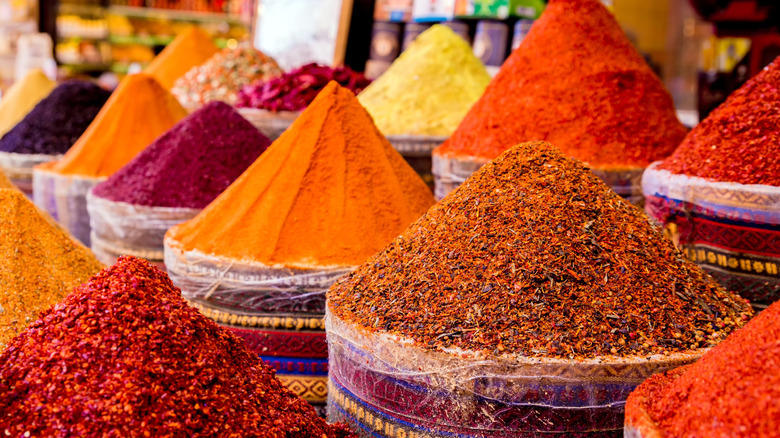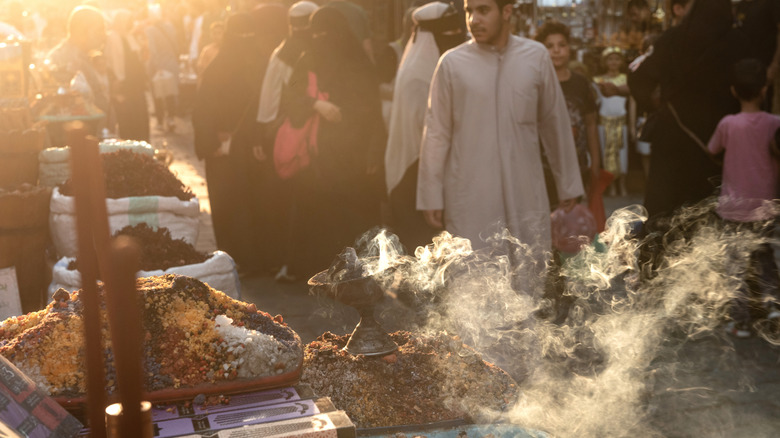What Every Tourist Needs To Know About Bargaining In Egypt's Markets
One of the highlights of travel is ... shopping. Specifically for unique local goods you can't find anywhere else. There's nothing like pulling out a wooden ornament from Austria or making authentic Sri Lankan tea to add some joy, spice, and nostalgia to your life once you're back home. The Middle East, which includes Egypt, is particularly famous for its incredible markets, which are ideal for budget-friendly souvenirs to consider bringing home. Some, like Cairo's Khan el-Khalili, are essential to visit, and not just for goods, but also for the many local food vendors. Many markets are popular with local Egyptians, too, and are an invaluable insight into Egyptian culture and atmosphere.
When buying souvenirs from these Egyptian markets (ideally straight from the artist or craftsperson), it's customary to bargain. In Cairo, you'll hardly see any prices as you wander down the winding alleyways and stone pathways of a local souk (market), whether on brass lamps, hand-sewn slippers, piles of spices, or delectable eats. Haggling is a normal part of the culture, but it's something of an art form. According to Fodor's Travel, "... you are expected to bargain with the seller until you agree on a price which theoretically satisfies both parties." A little research before you shop will go a long way in helping you learn some of the local lingo, familiarize yourself with fair and typical prices, and make sure you're respectful to the locals.
How to bargain in Egypt
Egypt's markets are a feast for the senses, with intriguing smells emanating from food stalls, brightly colored fabrics and spices catching the eye, vendors shouting their wares, buskers playing their instruments, hoping for a coin, and crowds of tourists. It can be overwhelming for a first-time visitor (or any visitor), so it's advisable to be a little prepared when it comes to shopping and bargaining.
Don't make eye contact and don't start haggling if you aren't genuinely interested in an item as it's considered rude and wasteful! Dressing respectfully always helps, so when planning what to wear in Egypt, bring clothes that cover your knees, cleavage (if you've got some), shoulders, elbows, and midriff. Make sure to carry cash, and it may be helpful to learn a few phrases in Arabic. Remember that it's customary to haggle, as it's seen as a good excuse for small talk. Be friendly but firm, smile a lot, and compliment the wares. Perhaps most importantly, establish what you're willing to pay. To get the best price, buy multiple items in one spot and haggle for a bulk deal, or shop near the end of the day when vendors are hoping to sell extra inventory.
More bargaining tips, where to shop in Egypt, and when to walk away
Although it may seem intimidating at first, it's easy to get caught up in the fever of bargaining. It pays to remember that the point is for it to be an acceptable deal for both parties, not just the buyer. It may be just a couple of dollars for you, but that money could go a long way for many Egyptians, who average $5,000 USD a year, earning around $2.40 an hour. One bonus of travel is that you're stimulating the local economy, so don't be a miser — and remember, tips are always expected!
The best places to shop (and therefore haggle) in Cairo are the famous 14th-century Khan el-Khalili souk, the historic al-Muizz Street, the El Azbakeya Wall (for books!), and the El Sagha Souk, a gold market. Elsewhere in Egypt, practice your haggling at Aswan's Old Souk, Luxor's Spice Market (bargain per gram, not per total cost), and Alexandria's Zane't el-Settat. The coolest souvenirs in these travel hot spots, in addition to spices and gold, include handpainted pottery, patterned scarves, intricate jewelry, papyrus goods, perfume and oils, backgammon sets (the game has a 5,000-year history in Egypt), metalworks, or food items like dates.
You'll likely haggle at all of these markets — and likely buy some incredible souvenirs. Just remember that you always have the option of walking away! If the vendor is hostile or too pushy, you can't agree on a price, or something else catches your eye, you can take a moment and circle back later. The spirit of haggling is good-natured, not argumentative, so use the chance to connect (however briefly) with a local, cheerfully and respectfully.


